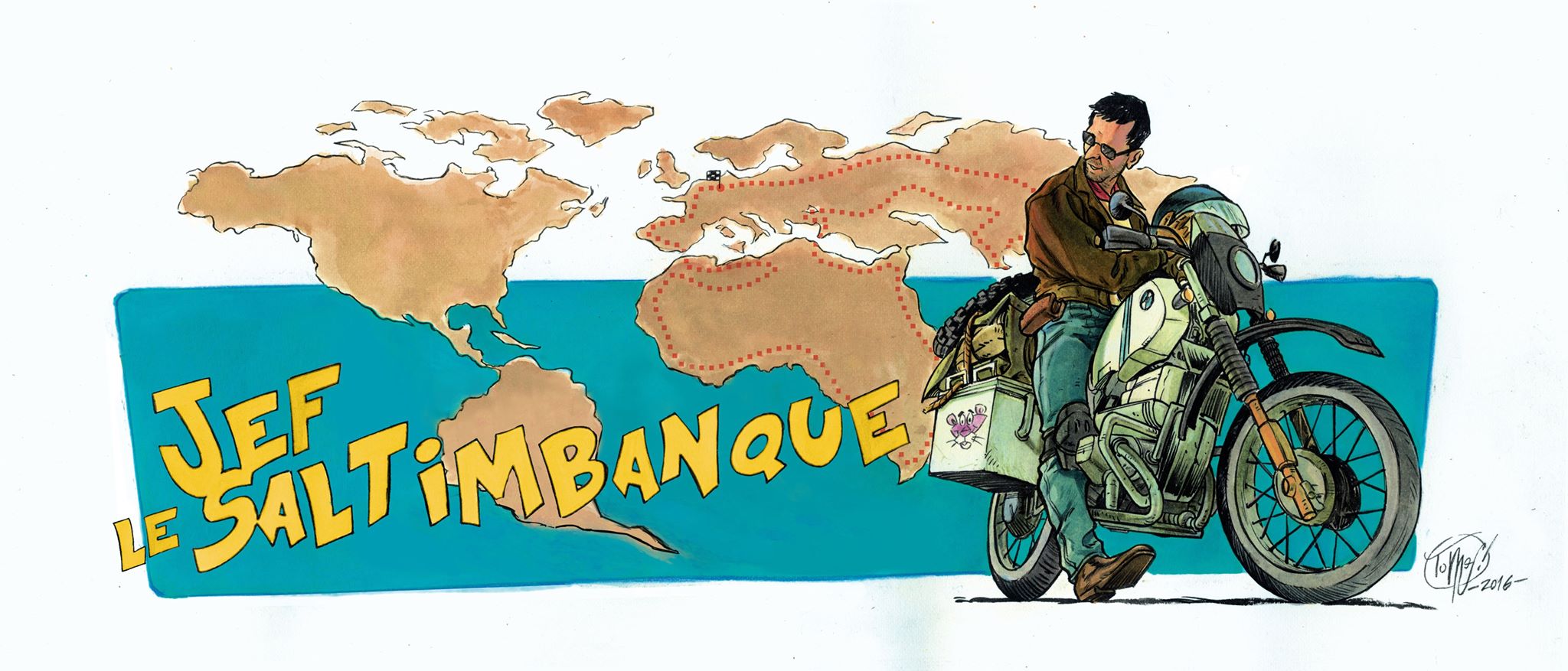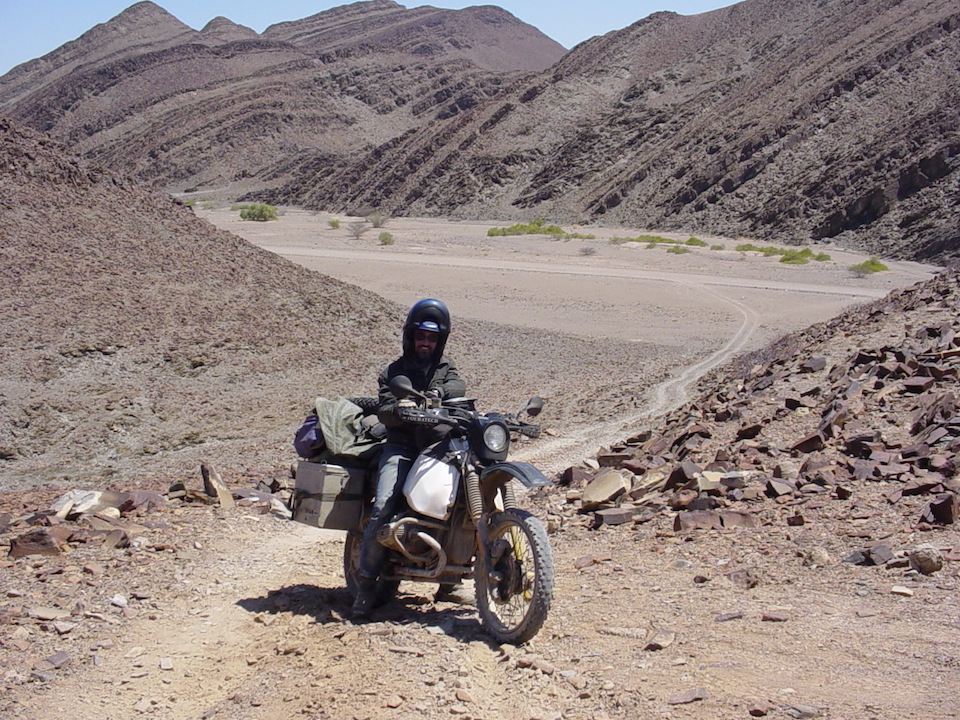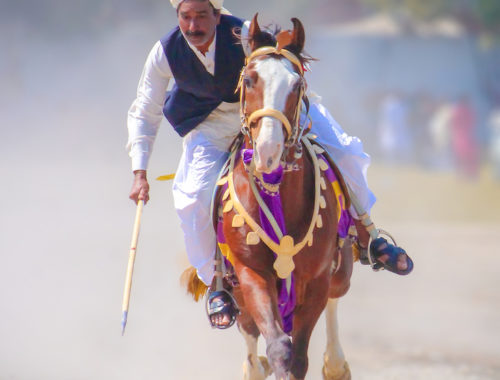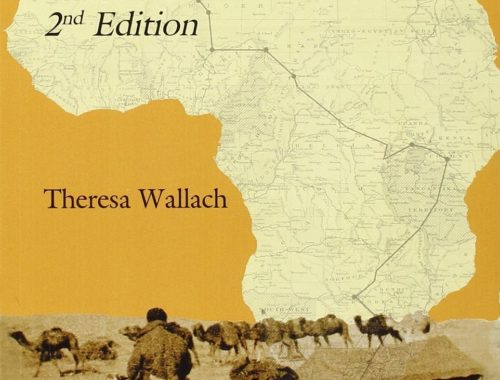Cet article est également disponible en : Français
This is the translation of an article published in the N°42 of Road Trip Magazine.
In 2003 and for 16 months, Jean-Jacques Aneyota travelled through Africa over a distance of more than 55,000 km. Back home after many adventures, sedentary life has regained its rights. Next year, however, a new start is planned. This time, he will lead Jean-Jacques to the East, to the countries in “Stan” for a period of time that he estimates at least one year, perhaps two… But what can they be the motivations of this strange traveller? Meeting….
Apart from the possible passion for travel and the thirst for discovery, can a more intimate or psychological reason be at the origin of this new journey?
A few years ago, a big dadais, Luc, contacted me to get some advice on how to prepare a motorcycle tour of Africa. A year later, he left. He stopped by my house for a few days. I was both happy for him and jealous to death. Then, for almost 3 years, I followed his journey. I even helped him logistically on two or three occasions. In Chad, I sent him, via an Air France crew, a small parcel containing, in addition to a few spare parts, an assortment of cheeses, a bottle of wine and confit. I had just forgotten to vacuum the cheese and I was cursed by the pilot (laughs). Luc tasted it all with the sisters of the convent where he had found refuge. In short, I’m moving away from the question but during the 3 years of his trip, my own desire to leave again became stronger and stronger. Then, at the beginning of 2014, I had a bad motorcycle accident that caused me to be forced to stop for a few months, my pelvis fractured. I think that’s when I decided to leave again, if only to prove to myself that I’m still able to do it.
This first big trip to Africa was in 2003. Today you are in the middle of preparations for a future raid that will start next year. Why did you wait so long?
Laugh! Laugh! Because of a woman, my wife. This is my personal paradox: I love adventure but I am attracted to ultra-feminine and ultra-citadine women. A little like Philippe Noiret and Catherine Deneuve in the film “L’Africain” by P. De Broca.
Did your trip to Africa, which you recount with great sensitivity in your book “Le Bandana Bleu”, trigger your taste for motorcycle adventure? Why?
No, not really. I’m a bit like Obelix, I fell into the pot of travel when I was a child. In the 1960s, when I was still a baby, my parents went wilderness camping in Spain. Then in the 1970s, we moved to Turkey. Tourism was still in its infancy. We spent a good part of my father’s holidays travelling through a little-known Turkey. Afterwards, my passion for horses kept me away from long-distance travel for many years. But this taste for travel has always been in me, and Africa I had dreamed of it since childhood.
Has this trip changed your lifestyle?
Yes, on many points, I think.
To name just one, following this trip, I married a Senegalese woman, which was probably the best way to continue this African journey. With Maty, Africa really came into my life. And believe me, a bicultural marriage is a real adventure. It is a kind of motionless journey but full of colour and twists and turns.
Do you think that the trip can be a headlong rush? (To escape problems, a complicated personal situation, a boring general bowl…). In this case is it a good remedy?
In Mauritania, I met a group of young people with integration difficulties who had just returned from a trip of several months. The project was called “The Mobile School”. I was surprised by the very positive dynamics of the group. Certainly, we felt that there were some strong heads in the lot, but all performed the tasks inherent to a bivouac with enthusiasm and enthusiasm.
More recently, I met Jeanne, my publisher Marc’s partner, who wrote a book with an evocative name: “Davaï Kamtchatka, du Burn-out à l’Aventure”.
So yes, the trip can be an excellent remedy for a complicated personal situation, whether it is a bereavement, which was my case, a burn-out or simply a huge boredom. On the other hand, care must be taken to ensure that this does not become a permanent headlong rush. Beware of overdose, because in this case the remedy can be quite destructive. I have met many of these permanent travellers on African roads. For some, this is a fully assumed and fulfilling way of life. But for others, we feel their loss of roots and they seem to drag their carcasses without any purpose. In the end, I think that travel is not recommended for fragile people, as it is true that there is one thing you can never run away from for very long: yourself.
On the other hand, to be fully successful on a trip, do you have to leave with a liberated mind?
When you leave, you leave a part of yourself. Kind of like a moult. So I think, intrinsically, we can only leave with a liberated mind. I mean, just leaving frees the mind. Maybe not immediately, but very quickly, after a maximum of 2 or 3 months. That’s even the problem: we don’t think enough about the return, which is the most complicated part of the trip. But if we think about it, then we’re no longer on the trip… so… so… I’ll say… carpe diem! And let the journey allow you to get to know that unknown person inside you.
Can the journey and the resulting discovery create a form of addiction?
Yes, it’s probably even the danger. I tend to say that travelling is a bit like eating a good spicy Mexican chili con carne: it inflames your senses. On the other hand, the return to daily life is more about eating cassoulet. Cassoulet is good, but compared to chili con carne, it may seem a little bland, even a little heavy and disgusting at first.
Can travel help find a form of serenity? In what way?
I think so, yes. For my part, I have acquired a detachment from the vagaries of life that I did not have before. This does not mean that I expect things to be done, but rather that I welcome good and bad moments with a relative “equality”.
For some, travel is a way to regain a form of freedom. What about you? What about you?
It is difficult to express the unspeakable sense of freedom that you feel on the day of departure. The past no longer exists, only the present moment and the idea of future adventures exist. It’s an intense feeling, one that will leave its mark on you for life.
Later, during the trip, a number of small rituals are established. My favorite is the morning one, when you leave your tent in the middle of nowhere: breakfast, check the bike, dismantle the camp and leave. In front of you, the unknown. It’s exciting.
More generally, I am firmly convinced that nomadism remains in our genetic heritage. Sedentarization is a relatively recent phenomenon in human history. It started about 10,000 years ago, I think.
The journey allows us to rediscover the freedom of the nomad, inscribed in us. And happiness is just that: a campfire, friends, laughter, food, the warmth of the earth under your feet and the freedom to go wherever you want.
In your opinion, what are the essential personal qualities to have in order to make a successful trip? Why? (Patience, curiosity, tolerance, humility…)
Montaigne, who loved to travel around France on horseback, said that when travelling, you shouldn’t “get carried away with yourself”.
In fact, when you leave, it is not enough simply to say goodbye to your family and friends, you must also and above all let yourself go, undress yourself from what you believe to be right or wrong, right or wrong, correct or wrong in order to recover the naivety and permeability of childhood.
So this naivety and permeability of childhood is for me the first of the qualities. Curiosity is only a corollary: all children are naturally curious.
Then, you need a certain stubbornness because sometimes, believe me, it’s damn hard.Is the meeting of other populations, other cultures a priority? Why?
To each his own truth. But for my part, when I look at the growing number of young people who are leaving around the world but who ultimately spend their time selfishing in all the places they cross and talking to their relatives who have stayed in France thanks to their tablet, I think to myself: what is the point?
Of course, the meeting is a priority. The other, the one you do not yet know, the one you will meet on the way, the one you go to when you close the door of your home, whether he is a prince or a beggar, this one will open the doors of another world, another form of thoughts and values for you. And the stranger he is today will become your brother, your companion sometimes, with whom you will share bread and laughter. It is these encounters that will make you a rich man. If not, you might as well stay at home.
Is the meeting of other populations, other cultures a priority? Why?
To each his own truth. But for my part, when I look at the growing number of young people who are leaving around the world but who ultimately spend their time selfishing in all the places they cross and talking to their relatives who have stayed in France thanks to their tablet, I think to myself: what is the point?
Of course, the meeting is a priority. The other, the one you do not yet know, the one you will meet on the way, the one you go to when you close the door of your home, whether he is a prince or a beggar, this one will open the doors of another world, another forum
Do we necessarily come back from a trip “richer” than when we left? To what extent?
We come back with a lot of doubts. But this wealth is immeasurable and makes you very humble and probably also more tolerant.
Do you prefer to travel alone or with others? Why?
Being two brings a certain security in very isolated areas.
On the other hand, the solitary journey favours the encounter because it becomes essential. Loneliness is with slowness, the best guarantee of a journey rich in shared moments. It may seem paradoxical, but that is the way it is. Together, we start to be a group. And the group, very often, is self-sufficient.
The ideal? Maybe couple trips. I didn’t have the chance to experience it. But what is certain is that I would no longer take more than two people on a long journey.
To go on a long trip, would you be willing to exchange your bike for a 4×4 for example? Why?
The SUV? Yes, I will probably come to that one day. It allows you to have your home with you. That’s very nice.
But in the end, each means of transport has its advantages and disadvantages. That’s not the most important thing. What matters is the rhythm. Travel is slow. The journey is slow. It is the only way to appreciate the distances and diversity of this world, it is the only way to cross eyes and smiles. Slow is a guarantee of intensity and encounters.
It is with this in mind that on my next trip, I plan to trade my bike for a horse for 2 or 3 months. Probably in Kyrgyzstan. The idea is to get as close as possible to the way of life of the local populations and to live at their rhythm. And probably also to be able to access areas that are inaccessible by motorcycle.






No Comments